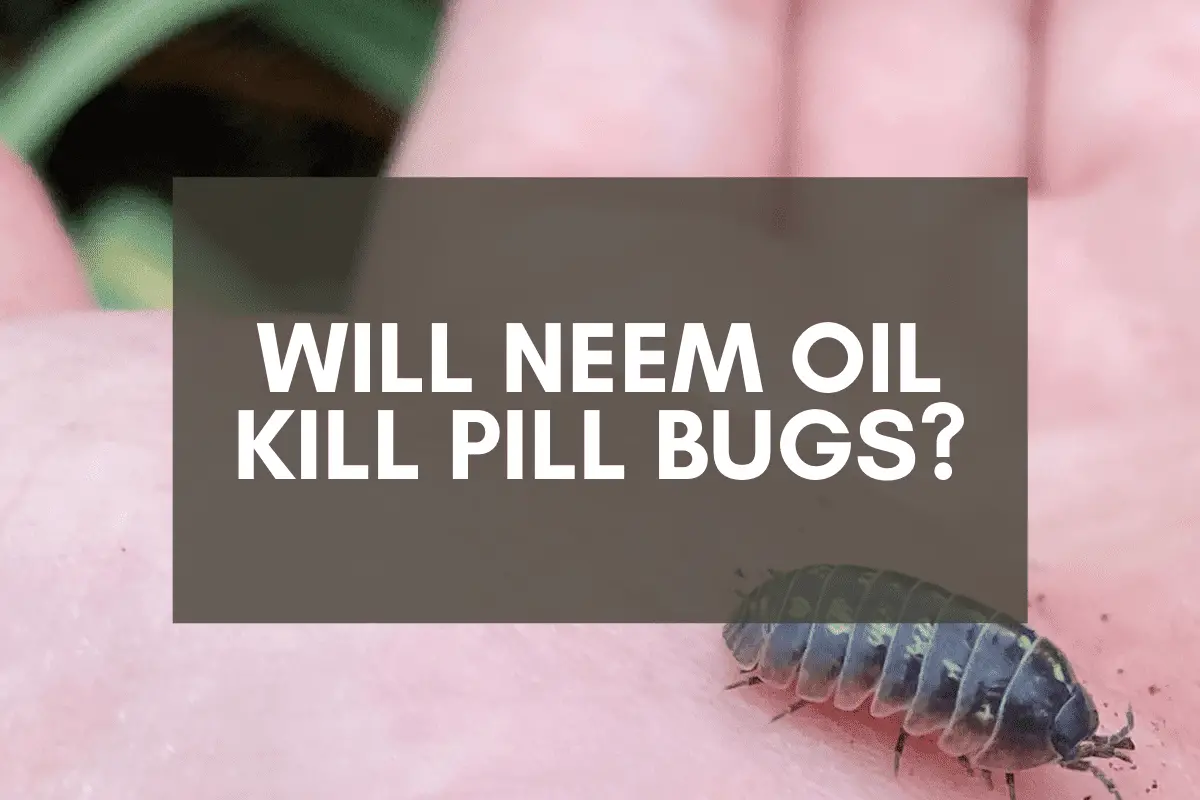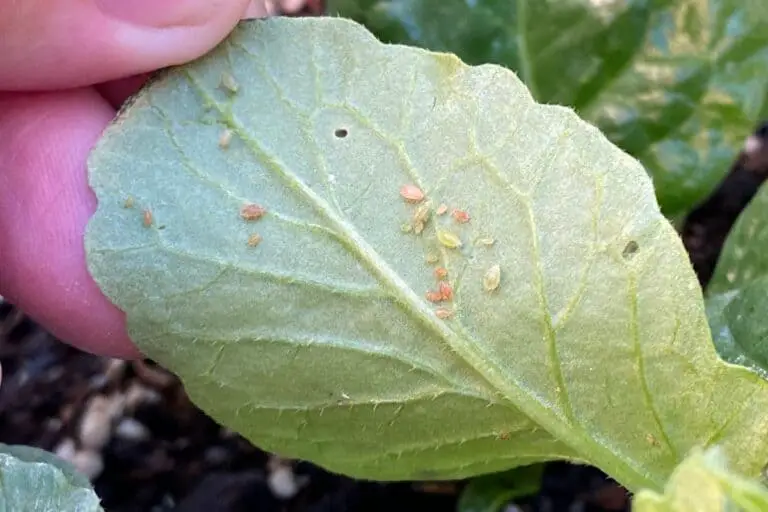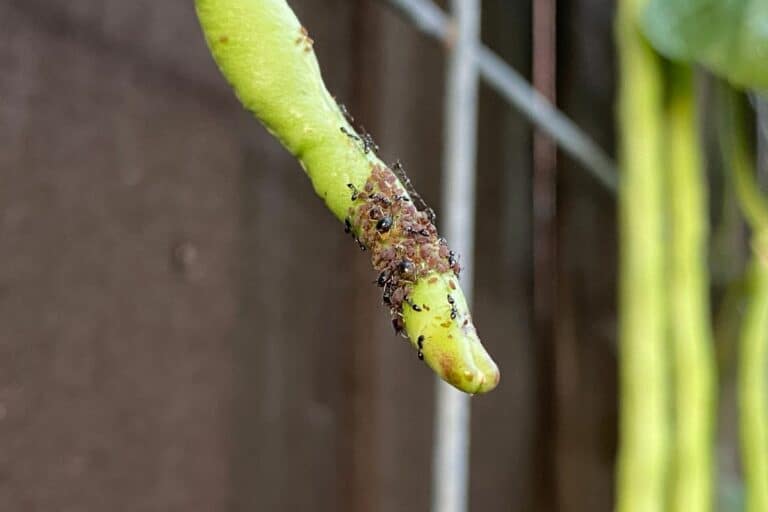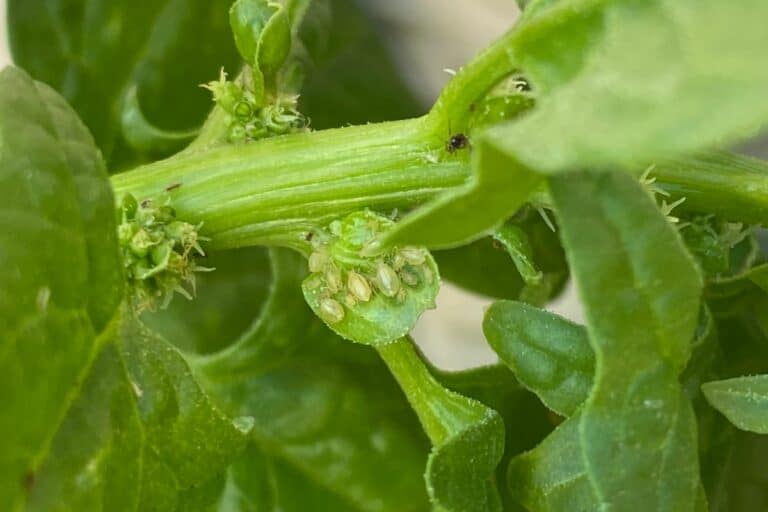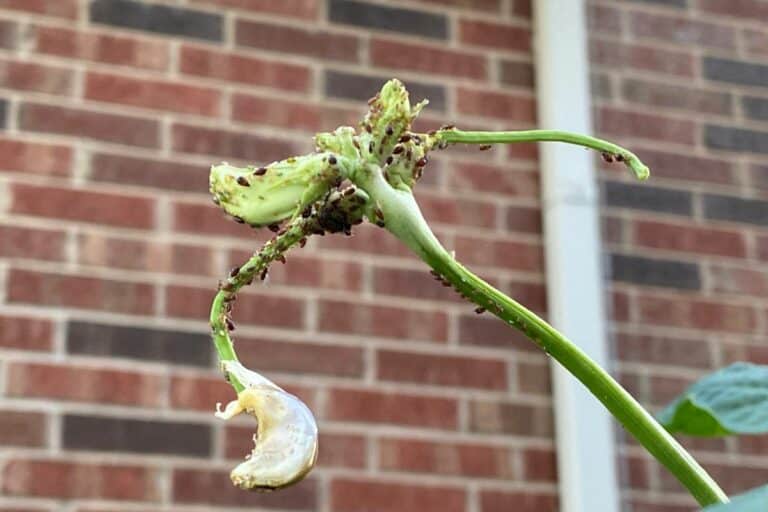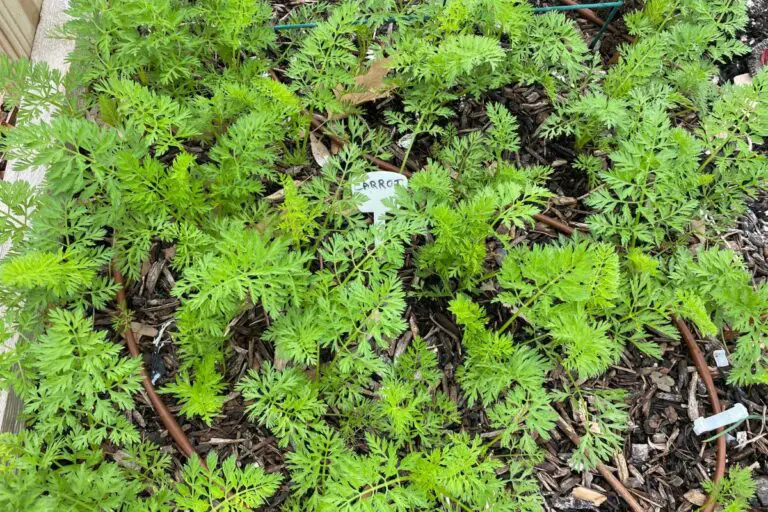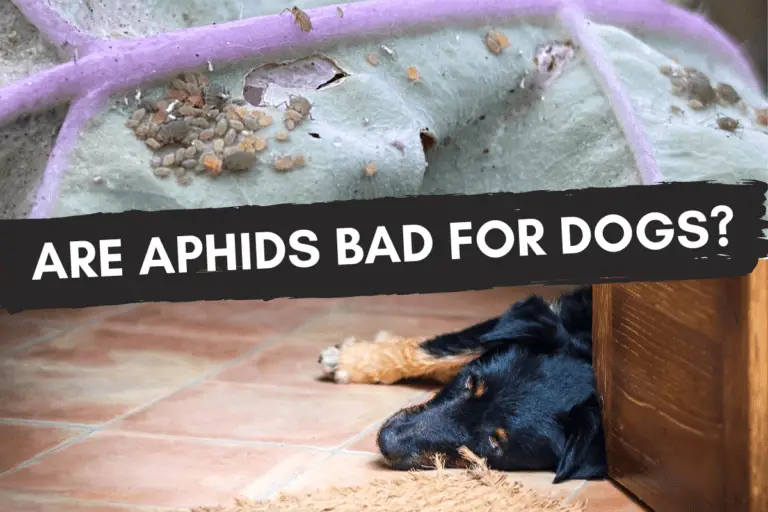Using Neem Oil to Kill Pill Bugs: Should You Try It?
Wherever you live, you’ve probably seen these little bugs. As a child, I called them “rollie pollies” or doodle bugs, but as I got older, I learned that most people refer to them as pill bugs.
Members of the family Armadillidiidae, pill bugs are a type of woodlice that thrive in damp areas, particularly among woody or leafy debris. They curl up into funny-looking small balls when threatened, and they play an important role in the decomposition processes taking place in your garden.
If this was all they did, they’d be pretty amazing. Unfortunately for us, they’re also capable of destroying seedlings, munching on leaves, and chewing through all kinds of veggies, fruits, and even tubers (more on this below).
Because of these destructive tendencies, you might be considering using neem oil when you see pill bugs in and around your garden. But is this a good idea? And will neem oil even kill pill bugs?
Neem oil is an ineffective solution to pill bug problems. To date, no scientific studies have been done to analyze its impact on rollie pollies, although available evidence suggests that neem oil might theoretically cause cellular damage if pill bugs ingest plant material soon after spraying.
Just to be clear: No one knows for sure if neem oil will harm or kill pill bugs because, as I just noted, there have been no peer-reviewed scientific studies on the subject.
But neem oil, when ingested, results in biological, hormonal, and reproductive problems in over 200 kinds of garden pests because its primary chemical compound, a naturally occurring chemical known as azadirachtin, causes all kinds of interruptions, misfires, and degradations at the cellular level.
This is why I’d suggest that it’s theoretically possible for neem oil to kill off pill bugs but that we don’t know much more beyond that.
But before we look at the challenges that’ll arise if you attempt to kill off pill bugs with neem oil, let’s take a quick look at a more fundamental question: Are pill bugs actually worth killing off?
To answer this question, I reached out to Dr. Steven Frank to see what he had to say. Dr. Frank is a professor of ecology and a specialist in pest management who runs the Insect Ecology and Integrated Pest Management lab at North Carolina State University.
“Overall,” Dr. Frank noted, “pill bugs are quite beneficial since they decompose organic matter and provide calcium rich snacks for birds and other creatures.”
I’ve seen bloggers and YouTubers recommend various ways to kill off pill bugs, but Dr. Frank brings up a good point about what we potentially lose if we remove them from our gardens, which I’ll explore in greater detail below.
Put simply, if you’re not careful when it comes to pill bugs, you might end up robbing your garden of these beneficial, albeit occasionally destructive, little helpers.
One quick note before we go any further. Pill bugs go by many different names: armadillo bugs, doodle bugs, potato bugs, woodlouse, not to mention several permutations of the name “roly poly” and funny names like “cheeselogs” or “fat pigs.”
However, I’ll be using the name “pill bug” throughout this article to keep things simple. Check out Wikipedia if you want to see a long list of pill bugs’ many other names.
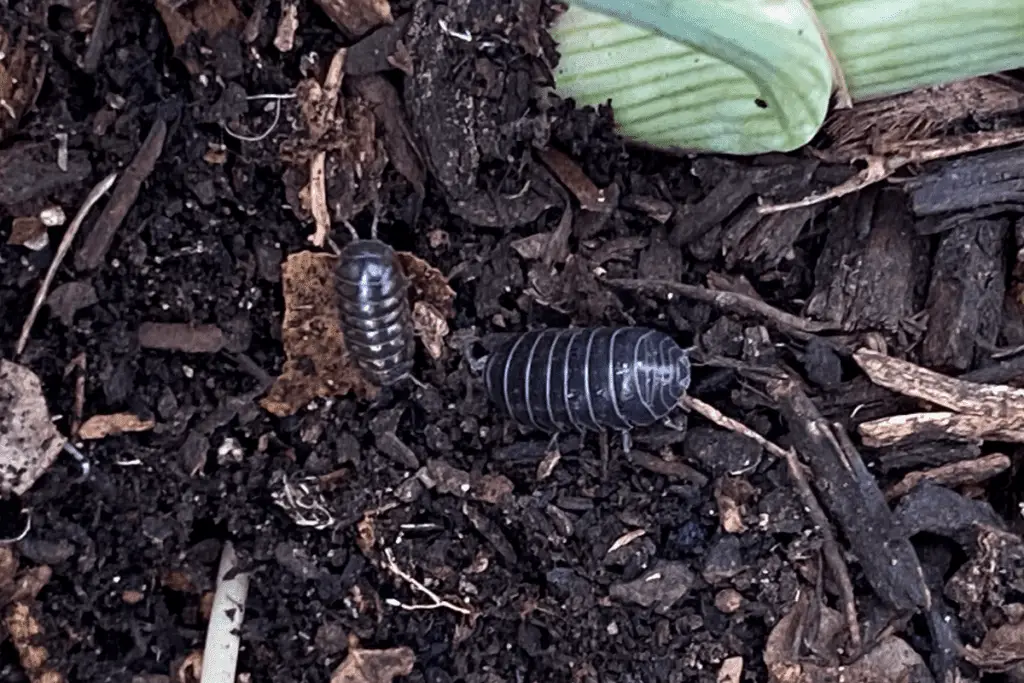
Are Pill Bugs Good or Bad? What Every Gardener Should Know
Unlike common pests such as aphids, spider mites, squash bugs, and whiteflies, pill bugs play an important role in healthy garden ecosystems…even as they cause us gardeners headaches every now and then.
Generally speaking, pill bugs serve a beneficial purpose in the garden. Although they sometimes cause plant damage, they speed along the decomposition process, and like miniature composting machines, they transform decaying plant matter into vital nutrients that are then returned to the soil.
In order to fully explain what’s going on when pill bugs munch on decaying plant material, let’s take a closer look at what the pill bug life cycle looks like and what those little rollie pollies are doing when they’re wandering around our gardens.
Female pill bugs carry their eggs in small pouches underneath their bodies. When pill bugs emerge from their eggs, they remain in their mother’s pouch for around 2 months, after which they leave the safety of that space in search of food.
Pill bugs are detritivores, which means that they’re scavengers that seek out dead or decaying plant matter. Simply put, they want nothing more than to find and ingest organic materials that have fallen to the surface of the soil and have begun to decay.
Unlike aphids, leaf-footed bugs, spider mites, and other plant-piercing insects, pill bugs use small jaws to chew up plant matter, then leave behind small mineral-rich droppings.
However, pill bugs also need such minerals to survive so they regularly engage in coprophagous eating habits (i.e. they eat their own poop). In doing so, they recapture some of the nutrients they previously lost but also further the overall decomposition process by breaking down organic materials several times over.
All of this sounds good, right?
Unfortunately, pill bugs also have destructive tendencies. In the absence of easily accessible decaying organic material, pill bugs will search elsewhere for food. They’ll prey on the stems and foliage of seedlings and smaller plants, as well as tubers, fruits, and many different vegetables. They’ll also scavenge among decomposing animal flesh in search of vital nutrients.
If you’ve had problems with pill bugs recently, you might be looking for ways to get rid of them. In what follows, I’ll look at what likely will happen if you attempt to use neem oil on pill bugs, and I’ll share a few tips for those who wish to reduce their destructive tendencies while not getting rid of pill bugs entirely.
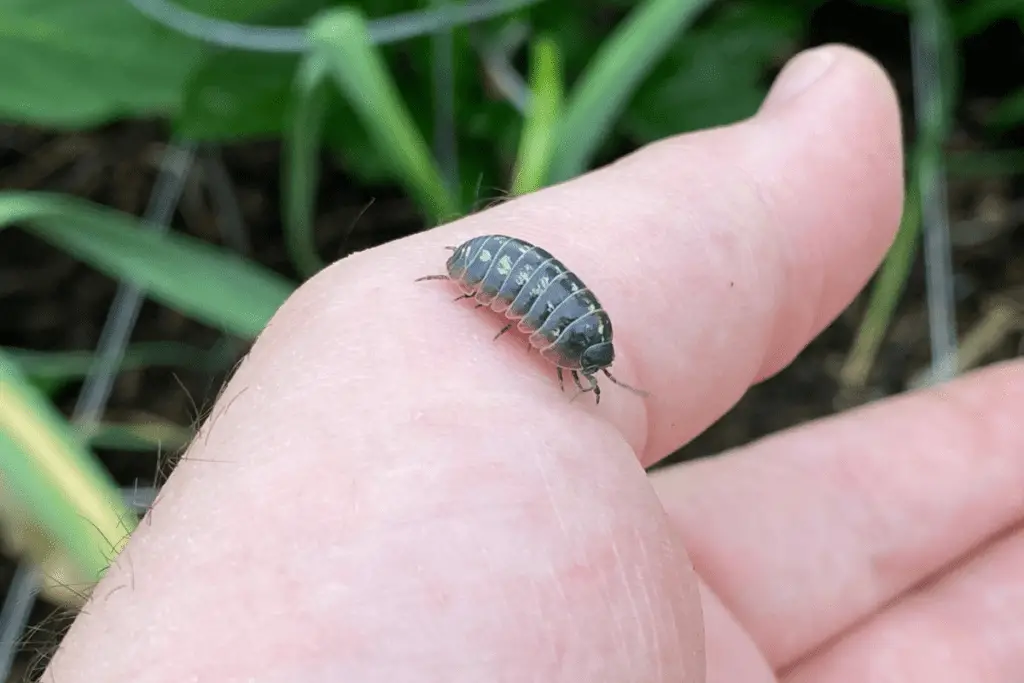
Does Neem Oil Stop Pill Bugs?
Neem oil does wonders in the garden if used effectively and stored properly. It doesn’t harm earthworms, ladybugs, pollinators, and most predatory bugs, but it’ll repel, harm, and kill 200+ bugs that pierce or munch on plant foliage.
But if you’re thinking about trying to rid your garden of pill bugs using neem oil, you might want to reconsider.
First, as I’ve noted above, pill bugs do a great deal of good in the garden, and even if you’ve got a lot of them and they’ve become somewhat destructive, there are ways to handle such problems without resorting to natural or chemical insecticides (which I’ll discuss below).
Second, there’s no guarantee that neem oil will solve your problems. There’s no scientific evidence that neem oil will harm pill bugs, but more importantly, pill bugs want to feed on dead, decaying organic matter, and neem oil is primarily designed to be sprayed on living organic matter.
Neem oil doesn’t work all that effectively when sprayed directly on bugs. It also degrades quickly when exposed to the elements, and it can burn your plants if you’re not careful when and how you apply it.
Of course, neem oil might temporarily repel bugs if you apply it as a soil drench or liberally spray it on the ground surrounding your plants. But this is, at best, a temporary solution since the pill bugs will simply return to that area in a few days once the neem oil fully degrades.
For neem oil to do any kind of harm to pill bugs, two things must happen: 1) the pill bugs will need to ingest it rather quickly and 2) it’ll need time to cause cellular damage (if it does so at all).
When ingested by aphids, armyworms, spider mites, and other common garden pests, neem oil causes all kinds of biological problems related to growth, feeding, molting, and reproduction.
But to get pill bugs to ingest neem oil, you’d have to get a bit creative. You’d need to try a soil drench or spray in areas where there’s plenty of decaying organic material, or you’d need to apply neem oil to your plants via foliar spray, then cut off small pieces of foliage and allow them to fall to the ground, hoping that pill bugs will take note and begin feeding within a day or two.
Of course, a soil drench could simply repel pill bugs for a few days, and there’s no guarantee that neem oil will remain viable for very long once plant material has fallen to soil level. We just don’t know since no one has ever studied such things.
In the absence of good scientific evidence–or even good anecdotal evidence–and because pill bugs play a beneficial role in the garden, I’d recommend avoiding neem oil altogether if your plants are being harmed by pill bugs.
How Do You Repel or Get Rid of Pill Bugs?
If you’ve decided that you need to stop the pill bug destruction in your garden, you’ve got a few options to consider:
1. Clean Out Decaying Plant Matter
Pill bugs are drawn to moist, decaying plant matters. If you’re looking for a quick fix to your pill bug problems, your best bet is to get rid of some of that material.
“If you find there are too many pill bugs in a location,” Dr. Frank noted, “consider removing leaf litter and other organic matter. That should do the trick.”
To keep your soil covered, you could even replace decaying organic matter with compost and wood chips.
I actually add both to my garden: The compost adds key nutrients to the soil, and the wood chips prevent splashing or soil runoff while also helping to keep everything as moist as possible during the hot summer months.
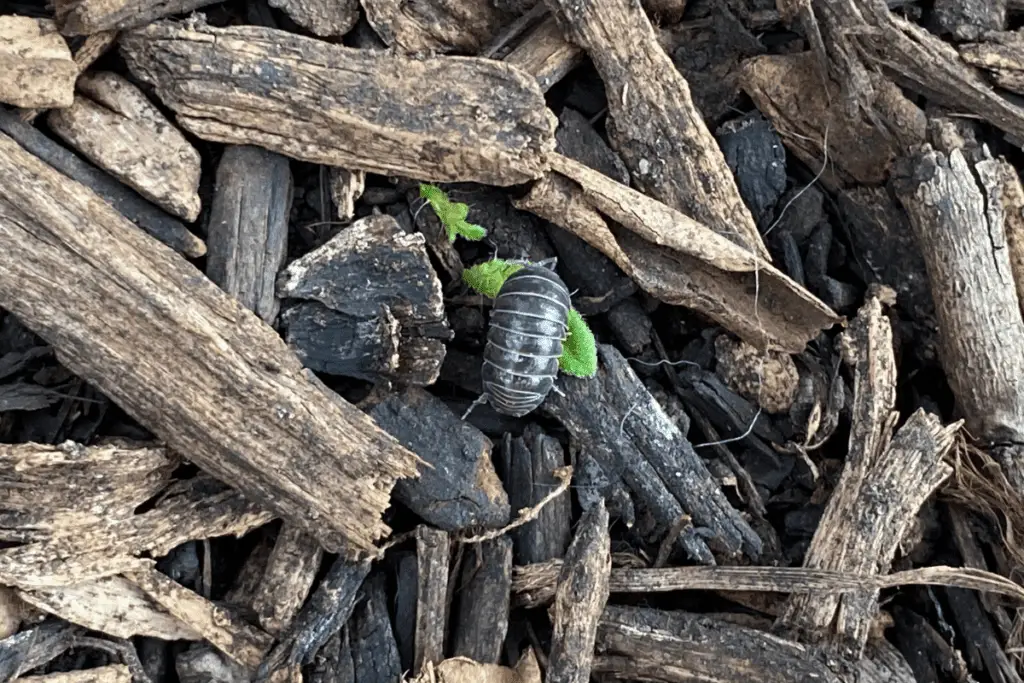
2. Give Pill Bugs Plenty of Organic Decoy Material
While I don’t want to harm pill bugs, I also don’t want them eating my seedlings or damaging my vegetables.
I know this might sound a bit silly, but here’s what I do: I purposefully leave organic matter for the pill bugs every time I’m clipping or pruning my plants.
When I prune my tomato plants, especially those lower limbs that drag the ground and pick up diseases, I won’t simply toss the excess leaves in the compost or trash bin. If the leaves are healthy-looking, I’ll use my fingers to rip them into smaller pieces, then drop them in the garden beds.
On the one hand, I’m giving the pill bugs plenty of rich organic matter to go after. On the other hand, I’m simultaneously distracting them from the seedlings or veggies that are growing nearby.
3. Use Potatoes or Fruit to Attract Pill Bugs
If you’d like to permanently remove pill bugs from your garden, your best bet is to attract as many of them as possible to one place, then collect them all at once and transport them elsewhere.
I find that the best way to do so is to cut a potato in half, then place the potato cut side down in your garden bed. The doodle bugs will be attracted to the potato, and you’ll likely find quite a few of them gathering around it the next morning. Once this happens, you can scoop up the potato along with all of the pill bugs and either transport the pill bugs to a new location far from your garden (my preferred method) or simply scrape the pill bugs into the compost pile or trash bin and reuse the potato.
You can do the same with various fruits, most especially with orange and cantaloupe rinds. Simply cut open the fruit and eat what you want, then place the rinds around your garden. The pill bugs will be drawn to the fruit rinds, and when you retrieve the rinds the following morning, you’ll likely have easy access to many pill bugs as well.
As I previously suggested, I think it’s a mistake to kill pill bugs since they’re nature’s little composters, but I understand the kind of destruction they can cause, which is why I prefer leaving lots of decoy organic matter in and around my garden plants.
Conclusion
When used properly, neem oil is an incredibly effective natural insecticide that I use to keep my eggplants, peppers, tomatoes, and other plants free of pests.
I’m careful when using neem on herbs or any delicate, wispy plants–and there’s been a time or two when I’ve needed to wash neem oil off my plants or rinse it off my veggies before eating–but overall, it’s a reliable way to keep plants healthy throughout the growing season.
I just don’t think it’s all that effective when addressing the destructive problems that are sometimes caused by pill bugs.
Simply put, I’ve instead found that I can have the best of both worlds by simply leaving plenty of organic material in my beds. The pill bugs leave my seedlings and veggies alone, and my garden reaps the benefit of having these miniature composters working in and around the soil.
Additional Information
If you’d like to learn more about how to use neem oil effectively, I recommend taking a quick look at these articles:
